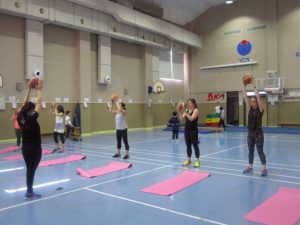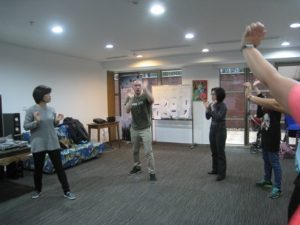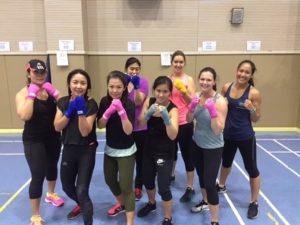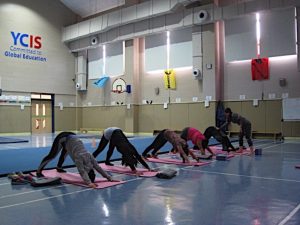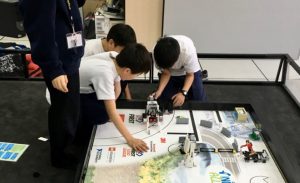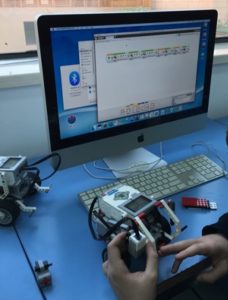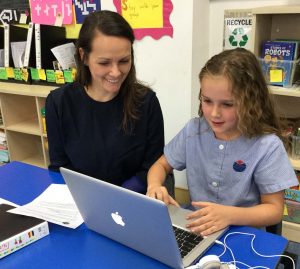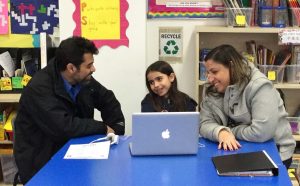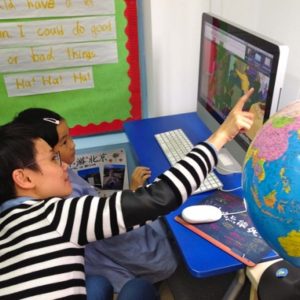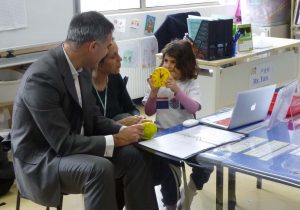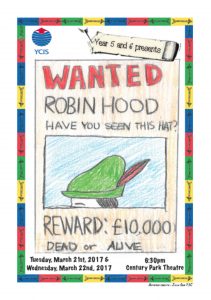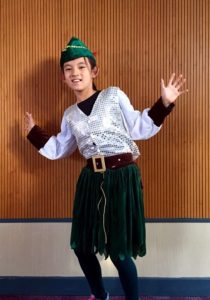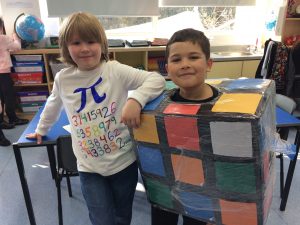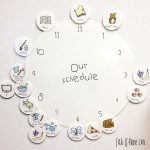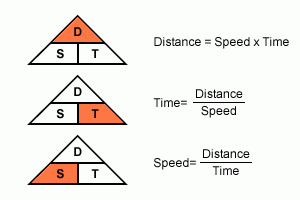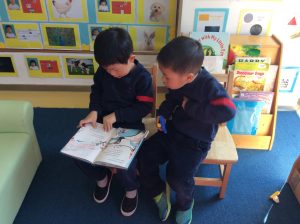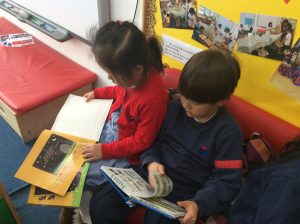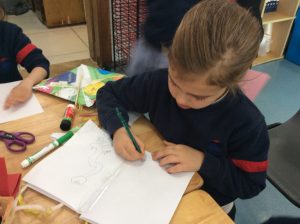Written by Roseline Yang (Community Relations Officer)
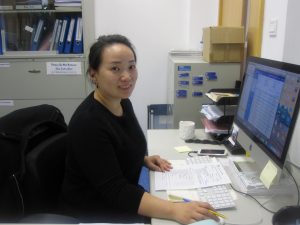 Many of you may know our office staff, specifically Ivy for ASA queries, Helen for questions about the bus or Renee for your general inquiries, as you may have dealt with them directly.
Many of you may know our office staff, specifically Ivy for ASA queries, Helen for questions about the bus or Renee for your general inquiries, as you may have dealt with them directly.
But do you know the person behind this orchestra? Meet Jenni Wang, our School Office Administrator.
After having lived in Canada for 10 years, Jenni is definitely another example of an “East-meets-West” culture person: a highly-effective & organized professional with the humility of a traditional Chinese person.
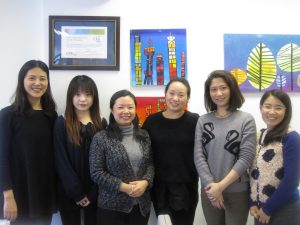 Let me be more explicit: Whenever I have a question regarding the school, no matter if it is about where to find a teacher, a child, how to book a room, or who is organizing a certain event, I know that I can ask Jenni and she will redirect me to the appropriate person. At school, if we want any notice to be shared with parents, our main contact is Jenni. She is our central point, our right-hand to reach out to you through the blog, email, sms and phone calls. But when we asked her to be our staff focus for this newsletter, she got back to me saying that she did not have anything special and that it would be nicer to introduce the entire school office staff instead.
Let me be more explicit: Whenever I have a question regarding the school, no matter if it is about where to find a teacher, a child, how to book a room, or who is organizing a certain event, I know that I can ask Jenni and she will redirect me to the appropriate person. At school, if we want any notice to be shared with parents, our main contact is Jenni. She is our central point, our right-hand to reach out to you through the blog, email, sms and phone calls. But when we asked her to be our staff focus for this newsletter, she got back to me saying that she did not have anything special and that it would be nicer to introduce the entire school office staff instead.
Let’s hear what Jenni can tell us about herself and the administration of the school office!
So Jenni, I was told you lived abroad for many years before coming back to Shanghai? Where were you and what did you do exactly?
I went to Georgia, USA as an exchange student in Grade 12 for one year. Then, I went to Canada to do my university studies. I spent 4 years in Peterborough doing my Bachelors in Economics and then went to Waterloo to study for my Masters in Business & Economics. After that, I worked in Toronto for 4 years in the manufacturing industry in the administration department. I went from administrative assistant to administrative manager, and I have dealt with different tasks from customer service to marketing. When I came back to Shanghai, I worked as an administrative manager in a real estate company and then in a toy company.
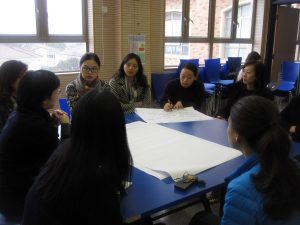 And here you are since December 2015 at Yew Chung! It seems that it is a great fit for your work as a school administrator since you seem to be juggling with so many different jobs here: translator – you help with the translation of our school notices, secretary – you take notes at all the meetings I’m attending, simultaneous translator – you do the simultaneous translation for the parent workshops, and Professional Development Assistant – you make sure to record the training of all teachers. There is probably more that I am not aware of. And of course, you are managing the school office. Can you tell us exactly what the scope of your responsibilities is?
And here you are since December 2015 at Yew Chung! It seems that it is a great fit for your work as a school administrator since you seem to be juggling with so many different jobs here: translator – you help with the translation of our school notices, secretary – you take notes at all the meetings I’m attending, simultaneous translator – you do the simultaneous translation for the parent workshops, and Professional Development Assistant – you make sure to record the training of all teachers. There is probably more that I am not aware of. And of course, you are managing the school office. Can you tell us exactly what the scope of your responsibilities is?
From my understanding, the responsibilities in a school office cover 4 main areas: The first one is everything student-related: school bus, ASA, on-line sign-up, data maintenance, student file, ID, documents for parents. The second part is everything related to parent communication: contact parents regarding any student issue, send information about the school by email and paper, manage the school newsletter and school blogs, and be the hotline for parents to answer their questions about a school trip or about a school event. The third part is to assist teachers with the record of their professional development, update the staff emergency phone tree and support the ECE & Primary Co-Principals, Damien and Mary. The fourth part is everything related to office and logistics: updating calendars, staff lists, setting up the conference room, ordering refreshments, as well as ensuring supplies for big events, not to mention smaller tasks such as copying and laminating, but on a large scale.
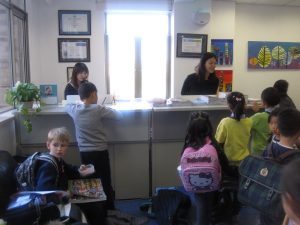 But what is your main role and how did you manage to cope with so many things so rapidly? I thought you had been working here for more than 5 years like the majority of the staff at school. So it was very surprising to know that you were almost as new as I was!
But what is your main role and how did you manage to cope with so many things so rapidly? I thought you had been working here for more than 5 years like the majority of the staff at school. So it was very surprising to know that you were almost as new as I was!
(shy smile) My role is to coordinate and manage the work among the school office team. It changes according to the time of the year, the time of the month, as the school life is very diverse. Therefore, our main tasks may change. However, each member of the school office team is focused on a main area.
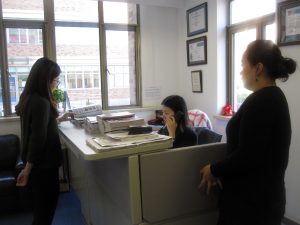 So, who is heading which area?
So, who is heading which area?
For example, for the Primary side, Helen takes care of the school bus. She is responsible for bus applications and attendance, whereas Ivy takes care of ASA online registration, attendances as well as event registration. She is also in charge of the translation of the newsletter and the editing part. For other communications, we share the workload for translation. Renee and Quincy are the first contact for the parents for general questions on the phone or by email. When it is rush hour, for example, when an outdoor ASA is cancelled because of the weather and parents need to be informed, the whole team gets on the phone and informs the parents. In ECE, Elain is the main contact person for parents, ECE teachers and she supports the ECE Coordinators, Veronica and Michelle. She also takes care of all the ECE children’s files but as I said earlier, we work as a team. Therefore, especially at the beginning of the year when there are a lot of files to create and sort, we share the amount of work among us.
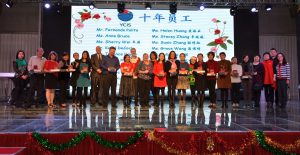 How did you adapt so quickly?
How did you adapt so quickly?
To be honest, I owe my quick adaptation to the constant support and help of Helen, Elain and Ivy who were very patient with me and always willing to help and give advice. They were great guides and their long experience at school was very useful – they indeed have been working for 5 years in the school and Helen just received her 10-year commitment award as you know!
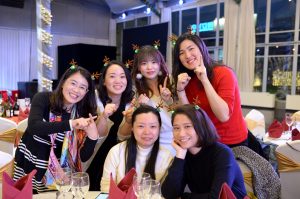 So, last question to conclude our interview. It is really fascinating to unravel all the things happening behind a school office, especially because you and your team are always smiling, positive and helpful: How do you keep everyone happy?
So, last question to conclude our interview. It is really fascinating to unravel all the things happening behind a school office, especially because you and your team are always smiling, positive and helpful: How do you keep everyone happy?
I think that we all care for each other and we support each other whenever needed, both for work and in our personal life. We make everyone feel at home, so even when the work sometimes becomes challenging, we are united, we keep learning and growing!
Our recent Beethoven & Friends concert featuring our Primary orchestra playing together with Secondary orchestra can be the reflection of how Jenni is coordinating her team between ECE and Primary buildings.
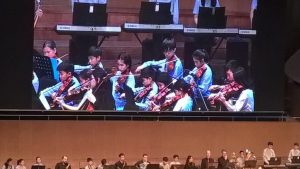 Can you imagine traveling to act and sing in a show in England? This is one experience that Sammy Soekarno in Y4B has had. Sammy is mostly known to fellow students at YCIS as being an amazing violinist, but Sammy also acts and sings.
Can you imagine traveling to act and sing in a show in England? This is one experience that Sammy Soekarno in Y4B has had. Sammy is mostly known to fellow students at YCIS as being an amazing violinist, but Sammy also acts and sings. At YCIS, Sammy is in Primary orchestra. He says, “In Primary orchestra, I’m the co-leader position.” This is something Sammy is proud of, but he is also proud that he is part of the school’s Seeds of Hope Orchestra. This is an orchestra that is comprised of students from the different Yew Chung and Yew Wah schools, and recently performed at the Shanghai Oriental Theater as a fundraiser for Seeds of Hope. Sammy was excited because he was excused from school for two days for rehearsals. “This is the first time I will be independent and so I made sure to finish all my homework,” explained Sammy.
At YCIS, Sammy is in Primary orchestra. He says, “In Primary orchestra, I’m the co-leader position.” This is something Sammy is proud of, but he is also proud that he is part of the school’s Seeds of Hope Orchestra. This is an orchestra that is comprised of students from the different Yew Chung and Yew Wah schools, and recently performed at the Shanghai Oriental Theater as a fundraiser for Seeds of Hope. Sammy was excited because he was excused from school for two days for rehearsals. “This is the first time I will be independent and so I made sure to finish all my homework,” explained Sammy. Sammy began the NSO Music and Drama when he was six years old. He has performed in five different musical dramas in Hong Kong and Shanghai. He even performed in a show called “The Incident” in which he traveled to England to preform for audiences in York and Richmond. Sammy enjoyed traveling with the group and his mother for this show and wouldn’t mind being part of another show in the future. He says, “We also did a couple of street performances that were really fun.” Sammy also auditioned and became part of the NSO orchestra when he was seven. They hold three concerts over the year and this month the NSO Spring Concert will take place at the Shanghai Children’s Art Theater. Sammy plans to continue with music and acting and possibly make it a career.
Sammy began the NSO Music and Drama when he was six years old. He has performed in five different musical dramas in Hong Kong and Shanghai. He even performed in a show called “The Incident” in which he traveled to England to preform for audiences in York and Richmond. Sammy enjoyed traveling with the group and his mother for this show and wouldn’t mind being part of another show in the future. He says, “We also did a couple of street performances that were really fun.” Sammy also auditioned and became part of the NSO orchestra when he was seven. They hold three concerts over the year and this month the NSO Spring Concert will take place at the Shanghai Children’s Art Theater. Sammy plans to continue with music and acting and possibly make it a career.






